Billy Bragg: ‘There’s nothing like going out there singing your truth. That ain’t changed’
The singer-songwriter’s brand of stubborn protest songs with a strain of tenderness has kept him relevant for 40 years. Here he talks about why he’s fighting for trans rights, his late-night tweeting habit and his forthcoming tour – with his son
Tim Adams
Sun 28 Apr 2024
Recently, Billy Bragg showed his two young granddaughters a little promo film he put together celebrating his 40 years of making records. The girls were nonplussed by the early scenes on picket lines and spiky festival stages, but towards the end, recognising an avuncular white-bearded bloke with a guitar, they brightened: “Look, it’s Grandad Bill!” they chorused. “It was actually all Grandad Bill,” their father pointed out, but they weren’t having any of it.
Meeting Bragg at the station car park in Weymouth – not far from where he lives along the Dorset coast – and heading up to a cafe on the headland overlooking the sweep of the bay, I sympathise a little bit with their sentiment. The first time I saw the singer in the flesh was sometime late in 1984, when he was giving it his full “one-man Clash” performance on student stages at miners’ benefits. Even at the time that felt like it might be a hard act to grow old with; yet here he is in the seaside retirement resort, still fighting the good fight.

You could never claim he has not put in the hard yards. As his old friend and former NME editor Neil Spencer says of their days together in Red Wedge, the mid-80s attempt to build youth opposition to the Thatcher government: “Billy was always first on the bus.” Bragg’s doing some concerts this summer, supported by his son, Jack Valero, also a singer-songwriter, to celebrate 20 years of the anti-Nazi collective Hope Not Hate. The promotion for those gigs gives a flavour of his commitment: “Bill’s words and actions have galvanised thousands of anti-fascists across the country,” the blurb states, going on to say: “During a difficult campaign against the fascist British National party in 2010, Billy delivered refreshments to hungry and tired activists – before performing a storming set on the eve of the elections. Barking and Dagenham was liberated, and the fascists were finally sent packing.”
Such billing brings pressures, not least that ever-present danger on the British left of looking like a 1980s tribute act. Bragg tells me he no longer plays what is perhaps his most easily parodied song of that era, Between the Wars: “I started to feel that my audience were becoming a bit nostalgic for the miners’ strike and Arthur Scargill and Margaret Thatcher. I wasn’t comfortable with that.”
Since his initial activist days, Bragg has found a solid international audience, particularly in the US and Australia. This began with his appearance at a Woody Guthrie tribute concert in Central Park in New York in 1992. After that performance, Guthrie’s daughter Nora approached Bragg to put music to some of her father’s unrecorded lyrics, which in turn led to a Grammy-nominated album of “new” Guthrie songs, Mermaid Avenue, performed by Bragg and the American rock band Wilco. Bragg remains the unofficial keeper of Guthrie’s radical flame; Nora gave him a Navajo blanket to sleep under in Dorset. He had a T-shirt bearing the question: “What would Woody do?” and you imagine it is a question that is never that far from his mind.
Some people sing about love, some about war, some about a better world to come. Well, I sing about all three
His most recent album, 2021’s The Million Things That Never Happened, featured the song Mid-Century Modern, a pointed attack on any complacency in his fans and himself:
It’s hard to get your bearings in a world that doesn’t care
Positions I took long ago feel comfy as an old armchair
But the kids that pull the statues down they challenge me to see
The gap between the man I am and the man I want to be
As he says: “If you are going to ask your audience to raise their fist in solidarity, you’ve also got to challenge them now and then.”
His own challenge is the restless motivation to keep finding the edge of political relevance. In recent years this has led him to various campaigning positions – on the train down to Dorset, I’ve been reading his thoughtful manifesto for reclaiming English nationalism from the right, The Progressive Patriot.
That desire for relevance also encouraged his response to Oliver Anthony’s viral folk song Rich Men North of Richmond, the adopted anthem of Donald Trump’s Republicans. Bragg wrote a quick version, Rich Men Earning North of a Million, to counter the way in which Oliver “shamefully punched down on people on welfare”.
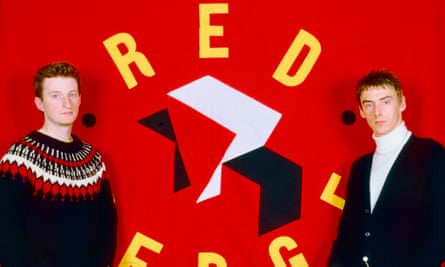
And, of course, that need to be on the latest contested frontline has expressed itself in Bragg becoming a prominent late-night warrior in that most fevered of all contemporary arenas: tweets on X about trans rights. (His first forays into these debates so enraged gender-critical feminists that several adopted his name as an ironic moniker.) Though he might speak to me of the need for compromise, he is not temperamentally inclined to take a step back from that fray.
If “Which side are you on, boys?” intransigence were Bragg’s only trait, he would probably be crankily insufferable after four decades. Listening to that adult lifetime of music, however, the vehemence of the ballads of working-class anger is in tension with the strain of vulnerable tenderness that has always been a feature of his writing. “Some people sing about love, some people sing about war, some people sing about a better world to come. Well, I sing about all three,” he says. Or to quote perhaps his most famous lines: “I don’t want to change the world / I’m not looking for a new England / I’m just looking for another girl.”
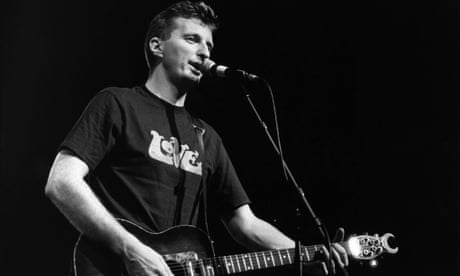
How we made: Billy Bragg’s A New England
Read more
The rasping Bragg voice still has the capacity – like any Ken Loach film – to make a grown man’s lip tremble. This happened most recently in his pair of songs for his “sweetheart and life partner”, Juliet De Valero Wills, who was being treated for breast cancer during lockdown: I Will Be Your Shield – a poignant reference both to his and the NHS’s encircling care – and The Fourteenth of February, a beautiful little acoustic hymn to their 30 years together.
He’s chosen this cafe because it’s at one end of a favourite cliff walk that he and Juliet do (in answer to my question about her health, he says happily: “She’s doing well now, thanks”). I’d originally asked if we might meet at his home, but he declined because he didn’t want it identified (I suspect he also may be wary of the seafront villa backdrop complicating his image). Anyhow, sitting down, the first thing we talk about is the impossibility of the fact that he has been doing this stuff for so long. Could he have imagined it?
“I was in New York last week and I was talking to someone about [the American folk legend] Pete Seeger,” he says. “They’re doing a biopic. I realised I first met Pete at the Festival of Political Songs in East Berlin in 1986. I thought he was like the ancient old man of the mountains. He was 66.” He laughs. “Same fucking age as I am now.”
Bragg has lost none of his Essex accent in his singing, and in conversation little of it has been softened by a quarter-century in proximity to West Country vowels. Sitting in the cafe’s windswept conservatory eating bubble and squeak and a fried egg – in homage to a favourite from his childhood – he occasionally attracts alarmed glances from retired couples in anoraks when talking in suitably robust terms about, say, the scandal of the Rwanda flights. He unashamedly closes his concerts with the same line he always used: “My name is Billy Bragg. I’m from Barking, Essex,” and he insists that it feels as true to him now as it ever did.
There’s a rural union tradition in this country as well as an industrial one. Why Labour has little to say to this part of the world I have no idea
I wonder how that line is understood by audiences in Austin or Adelaide? “As a sort of useful explanation for everything you’ve just heard,” he says. “Particularly if you are sitting there thinking: ‘What the hell was that?’” But the line is also a kind of political shorthand for the brand of identity he advocates. “I’ve never bought into this whole bullshit divide between ‘people of somewhere’ and ‘people of nowhere’,” he says, referencing David Goodhart’s explanation of the Brexity attractions of populism in a globalist world. “You can be a person who both has a cosmopolitan view of things, but who also has a strong sense of belonging to this particular group in this particular place.”
With this in mind, one of his lockdown projects was to put together an internet book of family history for his cousins and nephews.
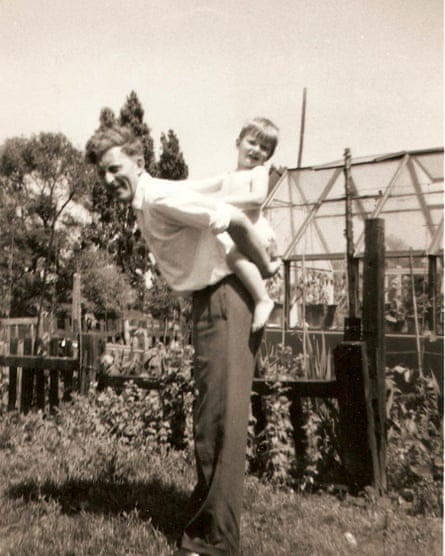
He gives me a quick potted history of the family tree. The Bragg side of things was mostly contained in a box of old pictures handed down from his great-grandfather, who ran a pub on Barking quay. His mum’s people were Italian immigrants, ice-cream sellers, who first settled on Cable Street in London’s East End, scene of the battle against Oswald Mosley’s Blackshirts. “The D’Ursos were all modern people, listening to Radio Luxembourg and all that. But the Braggs in Barking were stubbornly Victorian. My dad’s aunt was born in 1876, she lived round the corner from us; she still had gas lighting in her house when I was a kid.”
When he moved out of London in the millennium year, it might have looked as if he was distancing himself from some of his past, even selling out (that mortal fear of 1980s rebels), but that’s not how he viewed it.
“It was a commitment to spend more time with Juliet and Jack. And I’m glad I did it. It gave me a different perspective on this country. But I’m still a Londoner – I’ll always be a Londoner.”
Anyhow, he suggests, wherever you are in the world, you are never far from one frontline or another. He points to the fact that the Bibby Stockholm barge of asylum seekers is moored just around the bay. And that Richard Drax, whose £150m fortune originates in part from the family legacy in the slave trade, is the local MP. And that’s before you get to “the farmers and rural communities who have been sold down the river by Brexit”.
“We are a few miles down the road from Tolpuddle here, where it all started,” Bragg says. “There is a rural union tradition in this country, as well as an industrial one. Why Labour has little to say to this part of the world I have no idea.”
In this election year, Bragg has (once again) cut ties with the Labour party. What caused him to cut up his card on this occasion?
“All that ‘Israel has a right to defend itself,’” he says. “And to be fair, I felt I had put up with a lot. I voted for [Keir] Starmer as leader and I’ve still got on my desk his list of pledges. The nationalisation of utilities, the green New Deal, doing something on proportional representation. Those pledges suggested to me that Starmer was a development on [Jeremy] Corbyn, who was very much a 20th-century politician. And then you watch him just get rid of those pledges one after the other. The position on Gaza was the last straw for me.”skip past newsletter promotion
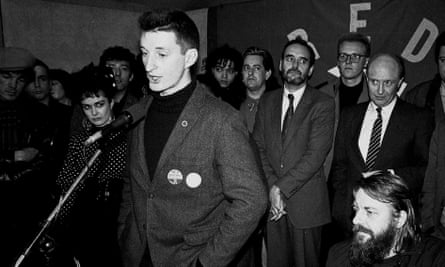
We briefly talk through that checklist of reasons not to be at all cheerful: Ukraine, Trump, the climate crisis. But he insists, despite everything, he is – raising his mineral water – a glass-half-full person. There’s a simple reason for that: “Because when I get depressed or cynical, I have the privilege of being able to go out in the dark and sing my songs, and when everyone claps, I don’t feel so bad. What I hope to do in my gigs is for the audience to feel like that too. That at least there’s this roomful of people in their town who do give a shit. Music can’t change the world, but it can do that.”
There is an entertaining authorised biography of Bragg, Still Suitable for Miners, by the journalist Andrew Collins, which details his steps towards his vocation. Born Stephen Bragg, he was badly bullied at school, he lost his dad when he was 18 and briefly joined the army before strapping on his guitar and finding other battles.
“The first Rock Against Racism concert [in 1978] was the spark for me,” he says now. “It was all there ready, but I needed to see those 80,000 kids just like me in Victoria Park [in east London]. On that day, my generation found our issue, as the previous generations had with Vietnam and CND. And it was to end discrimination of all kinds. Not just racism, but homophobia – we would be the generation that defeated apartheid and supported Pride.”
This isn’t something that comes from Twitter. [Being trans] is something that people feel inside
And he could immediately see a role for himself in that generational campaign? He smiles. “One thing was I had never met an out gay man until then. I’m sure I had met gay men in Barking but none of them were out. And then on stage Tom Robinson starting up with (Sing If You’re) Glad to Be Gay and all around me these blokes started kissing each other. I thought: ‘Fucking hell, what’s this?’ But it didn’t take me long to realise that it was a common cause – that the fascists are after anyone who is different, any minority. But you need those experiences to discover that solidarity.”
It’s a memory of that moment, I think, that has prompted his partisan anger on the issue of trans rights, his opposition to feminists such as JK Rowling, who argue for biological women’s right to their own protected spaces.
Speaking to the self-styled “luxury communist” Ash Sarkar earlier this year, Bragg suggested he was embarrassed to have come to the issue fairly late. His instincts went back to old ties of solidarity against discrimination. In particular, remembering the role that the campaigning group had played in gay and lesbian liberation during the 80s: “I wanted to start by saying it’s not a good idea to bring down Stonewall.”
The day we meet is the day after the Cass report on NHS gender identity services for children and young people has been published, which at the very least seems to offer sensible checks and balances to the position that the current incarnation of Stonewall has promoted and to the online and real-world efforts to cancel those who refuse it.
Bragg tells me he welcomes Dr Hilary Cass’s findings, at least up to a point: “I’m 100% behind a holistic approach to supporting kids,” he says. But he considers Cass to put too strong an emphasis on social media. “That’s just victim blaming,” he says.
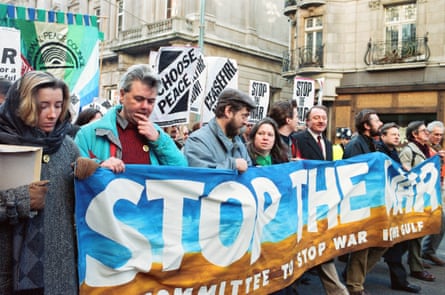
Though he recognises the potential harm of early medical intervention in dysmorphia cases, he fears that the report will give strength to those who “say that trans kids don’t exist. They tried to do that with section 28 with gays and lesbians. But this isn’t something that comes from Twitter. This is something that people feel inside. This is a serious problem that people need help with. And when we say trans kids, we mean people up to the age of 16; not – as Cass weirdly seems to say – people up to age 25.”
There are plenty of voices out there that rebut that latter interpretation, and a subsequent Q&A between Cass and LGBTQ+ groups clarified some of those contentions. My own strongest feeling, I tell him – I reported on the cultish-seeming evangelism of the Mermaids group lobbying for the untested certainties of hormone treatment way back in 2016 – was that if ever there was an issue that social media is ill-equipped to debate, it is this one. I haven’t seen evidence for Bragg’s assertion that his most prominent opponents are “saying that trans people don’t exist”. Surely it is more the case that we are talking about different complex views in a genuine conflict of rights.
“My problem with people like Rowling, like Julie Bindel, is really who they are lined up with,” he says. “[Rowling and Bindel] are people who I agree with about women’s rights. I agree with them about abortion. But we don’t agree on this. It reminds me of a TV debate I did back with Red Wedge; on one side of the table was me, Jerry Dammers and Clare Short, and on the other Stewart Copeland, a Tory MP called Greg Knight and Chris Dean from the Redskins. Now, me and Chris had toured during the miners’ strike, but I looked at Chris, and pointed to who he was sitting with, and told him he was on the wrong side of the table. And that’s what I see with Rowling and the others: they are on the wrong side of the table.”
His argument is that some of his opponents on the issue appear to be giving strength to anti-trans campaigns on the fundamentalist religious right in the US and elsewhere – that if any ground is given “the next thing will be an assault on equal marriage and abortion”. But of course there is no suggestion at all that Rowling or Bindel have any sympathy with those groups so, again, isn’t that a problem of social media platforms themselves, which are engineered to promote simple binaries over nuanced argument, and which reinforce “which side are you on” tribalism.
He seems to agree, when we talk, that it might be better to aim fire at those extremist reactionary groups but reserves his right to defend his corner if “people are spitting at him” on X. We go around the houses on this for a while, before finding a bit of neutral ground in the idea that it is partly the job of our generation to “get out of the way” and let the young find their solutions. Subsequently, he sends me one or two extreme tweets (not from any of his prominent “opponents”) that confirm his view that there are people out there who argue trans children do not exist. Last week he was still firing off threads – all rigorously refuted – that cast doubt on Cass’s conclusions.
In our interview, though, talk of future generations brings us off the subject and on to discussing how he feels about performing alongside his son, Jack, on his forthcoming mini tour. I ask what advice he’s given him about following in the family trade?

“I wouldn’t dare to tell him how to write songs – that’s not my place at all,” he says. “And he learned to play guitar by playing Guitar Hero. What he doesn’t have is any illusions. I came into this job with lots of fabulous preconceptions about limousines and playing Wembley stadium. Jack’s grown up seeing what it’s like behind the curtain. It’s a very different landscape now. But still there’s nothing better than going out there singing your truth. That ain’t changed.”
We talk a bit about the challenges faced by that generation in terms of mental health – how social media has fractured collective identities.
“The thing is,” Bragg says, “my therapy group was me and my friends sitting around playing guitars in my mum’s back room. Not only did they save me from getting my arse kicked in Barking, it also gave me the confidence to express myself. And going out on stage on my own, not as Stephen Bragg but as Billy, was my final proof to myself that I wasn’t afraid of anything.”
He regrets not standing up a bit more to bullies as a kid, but he’d like to think he’s made up for that since.
“Stephen Bragg was this sad guy I went to school with,” he says. “I feel so sorry for him when I see photographs of him – he was a good lad and he didn’t stand a fucking chance. I like to think Billy Bragg put his arm around him and said: ‘Listen, stick with the guitar player; we’re gonna be OK.’ I sort of think they are two completely different people, but my old friends would probably disagree. They’d say: ‘It’s just that these days’” – as his granddaughters understand – “‘one of them’s got grey hair and a beard.’”
Billy Bragg is on tour from 8 May



